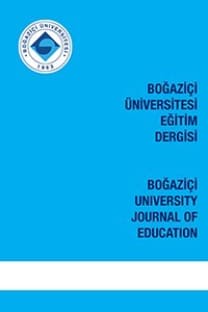Öğretmenlerin Yeniliğe Yönelik Kişisel Yaklaşımlarını Ortaya Çıkarmak
Öğretmen eğitimi derslerinde, İngilizcenin mevcut çeşitliliği ve bunun öğretim üzerindeki etkileri konusunda farkındalık oluşturulduğunda, bu bakış açısı daha sonra öğretmenlerin sınıflarında görülecektir. ENRICH eğitiminde düşündürücü etkinliklerle ve öğretmenlerin ortak dil olarak İngilizce (ODİ) farkındalığına sahip bir yaklaşım içinde dil öğrenimi ve öğretimi hakkında kişisel görüş ve inançlarını paylaştığı forumda, öğretmenlerin ODİ farkındalığı artıldı. Eğitim sırasında meydana gelen değişiklikleri araştırmak için, bir grup katılımcı öğretmenin düşündürücü etkinliklere yanıt verirkenki müdahaleleri yoluyla bakış açılarındaki değişimi analiz etmek için belirli bir mercek kullanıldı. Öğretmenlerin diline ilişkin derlem temelli bir söylem analizi, öğretmenlerin değişim sürecinde hem faillik hem de anlam çıkarımı açısından konumlanmalarını ortaya çıkardı.
Anahtar Kelimeler:
ODİ- farkındalığı, söylem analizi, derlem-tabanlı, derlem-odaklı, yansıtma
Unveiling Teachers’ Personal Responses to Innovation
When awareness of the current plurality of English and of its implications for teaching is raised in teacher education courses, this perspective will afterwards emerge in teachers’ classrooms. Teachers’ ELF awareness was enhanced in the ENRICH course through reflective activities and in the forum where teachers shared personal views and beliefs about language learning and teaching within an ELF aware approach. In order to investigate the changes occurring during the course, a specific lens was used to analyze a group of participant teachers’ shift in perspective through their interventions when responding to reflective activities. A corpus-based discourse analysis of teachers’ language unveiled their positioning in terms of both their agency and their sense-making in a process of change.
Keywords:
ELF awareness, discourse analysis, Corpus-based, Corpus-driven, reflection ODİ- farkındalığı, söylem analizi, derlem-tabanlı, derlem-odaklı, yansıtma,
___
- Basturkmen, H. (2012). Review of research into the correspondence between language teachers' stated beliefs and practices. System. 40(2), 282-295.
- Bayyurt, Y. & Dewey, M. (2020). Locating ELF in ELT. ELT Journal, 74(4), 369-376.
- Bayyurt, Y. & Sifakis, N. (2015). ELF-Aware In-Service teacher education: A transformative perspective. In H. Bowles & A. Cogo (Eds.), International perspectives on English as a lingua franca (pp.117-135). Palgrave McMillan.
- Biber, D. (1993). Representativeness in Corpus Design. Literary and Linguistic Computing, 8(4), 243-257.
- Birello, M. (2012). Teacher cognition and language teacher education: Beliefs and practice. A conversation with Simon Borg. Ballaterra Journal of Teaching & Learning Language & Literature, 5(2), 88-94.
- Bolasco, S. (2013). L’analisi automatica dei testi. Fare ricerca con il text mining. Roma: Carocci.
- de Haan, P. (2011). The optimum corpus sample size?. In G. Leitner (ed.), New directions in English language corpora. De Gruyter Mouton (pp. 3-20). https://doi.org/10.1515/9783110878202.3
- Dewey, M. & Pineda, I. (2020). ELF and Teacher Education: Attitudes and beliefs. ELT Journal, 74(4), 428–441.
- Flowerdew, L. (2012) Corpus-based discourse analysis. In J.P. Gee & M. Handford (Eds.), Routledge handbook of discourse analysis (pp.174-187). Routledge.
- Freeman, D. (2016). Educating second language teachers. Cambridge University Press.
- Freeman, D. & K. Johnson (1998). Re-conceptualising the Knowledge Base of Language Teacher Education. TESOL Quarterly, 32(1), 397-411.
- Gimenez, T., El Kadri, M. S., & Calvo, L. C. S. (Eds.). (2017). English as a lingua franca in teacher education: A Brazilian perspective (Vol. 10). de Gruyter Mouton
- Graddol, D. (2006). English next (Vol. 62). Milton Keynes: British Council.
- Halliday, M. A. K. (1994). An Introduction to functional grammar (2nd ed.). Edward Arnold.
- Jenkins, J., Cogo, A., & Dewey, M. (2011). Review of developments in research into English as a Lingua Franca. Language Teaching, 44(3), 281-315.
- Keteelar, E. (2012) Teachers and innovations: on the role of ownership, sense-making, and agency. Technische Universiteit Eindhoven.
- Llurda, E. (2004) NNS teachers and English as an International language. International Journal of Applied Linguistics, 14(3), 314-323.
- Llurda, E. (2018). English language teachers and ELF. In J. Jenkins, W. Baker and M. Dewey (Eds.), The Routledge handbook of English as a lingua franca (pp. 518-527). Routledge.
- Llurda, E. & Mocanu, V. (2018). Changing teachers’ attitudes towards English as a lingua franca. In N. C. Sifakis & N. Tsantila (Eds.), English as a lingua franca in EFL contexts, (pp. 162-177). De Gruyter.
- Lopriore, L. (2016). Revisiting English. New paradigms. SILTA. Studi Italiani di Linguistica Teorica e Applicata, 45(1), 93-106.
- Lopriore, L. (2017). Voicing beliefs and dilemmas from WE- and ELF-Aware reflective teacher education contexts. Teachers’ personal responses to rapidly changing multilingual contexts. Lingue & Linguaggi, 24, 73-86.
- Mauranen, A. (2012). Exploring ELF: Academic English shaped by non-native speakers. Cambridge University Press
- Maughan, S., Teeman, D., & Wilson, R. (2012). What leads to positive change in teaching practice. NFER.
- Pennycook, A. (2006). Global Englishes and transcultural flows. Routledge
- Schön, D. A. (1983). The reflective practitioner: How professionals think in action. Temple Smith.
- Seidlhofer, B. (2009) Common ground and different realities: World Englishes and English as a lingua franca. World Englishes, 28(2), 236-245.
- Seidlhofer, B. (2011) Understanding English as a lingua franca. Oxford University Press.
- Sifakis, N. C. (2019) ELF Awareness in English language teaching: Principles and processes, Applied Linguistics, 40(2), 288–306.
- Sifakis, N. C. & Bayyurt, Y. (2018). ELF-aware teaching, learning and teacher development. In J. Jenkins, W. Baker & M. Dewey (Eds.), The Routledge handbook of English as a lingua franca, (pp. 456−467). Routledge.
- ISSN: 1300-9567
- Yayın Aralığı: Yılda 2 Sayı
- Başlangıç: 1976
- Yayıncı: Boğaziçi Üniversitesi
Sayıdaki Diğer Makaleler
Yükseköğretimdeki Uzaktan Eğitimde Gelişen Yeni Öğrenci ve Öğretim Elemanı Rolleri
Öğretmenlerin Yeniliğe Yönelik Kişisel Yaklaşımlarını Ortaya Çıkarmak
Lucilla LOPRİORE, Alessandra CANNELLİ, Valeria FİASCO, Silvia SPERTİ
Kırsal-Kent Başarı Farkını Açıklayan Öğrenci ve Okul Özellikleri: TIMSS 2019 Analizi
Safiye BİLİCAN DEMİR, Özen YILDIRIM
Eğitimde Ölçme ve Değerlendirme Uygulamaları Ulusal Kongresi Özel Sayısı
Elenı TSOMPANAKI, Konstantinos MAGOS
Paraskevi THOMOU, Christina TEGOU, Thomais ROUSOULİOTİ
Lucilla LOPRİORE, Natasha TSANTİLA
Öğretmenlerin ve Öğrencilerin Odi Zihin Halini Geliştirmek: ENRICH Projesinin İlkeleri ve Önermeleri
ODİ İletişimi: Pedagojik Katalizörden ODİ Oyun Değiştiriciye
